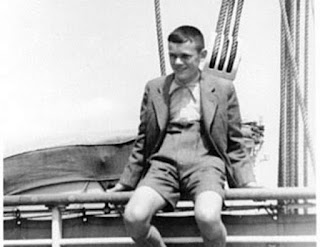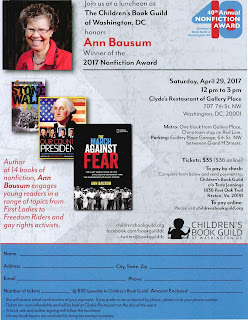by Karen Leggett Abouraya
Children’s Book Guild 2018 Nonfiction Award Winner Phillip
Hoose has always been intrigued by young people who
make a difference in their world. They
are the subject of most of his books, especially after Sarah Rosen - a teenager in
South Bend, Indiana - asked him, “We’re
not taught about young people who have made a difference. Studying history
almost makes you feel like you’re not a real person.” Hoose decided he would be
the author to find and share the stories of real young people making a
difference.
Hoose brings young leaders to life, including Sarah Rosen in
It’s Our World, Too! along with many
more in We Were There, Too! Young People
in U.S. History. With the meticulous research that characterizes all of his
books, Hoose has identified youngsters who sailed with Christopher Columbus
right up to those who have been active in the 20th and 21st
centuries: Olaudah Equiano, who was kidnapped into slavery in Benin, Africa, in
1756; teens Billy Bates and Dick King who escaped from the dreaded
Andersonville prison during the Civil War; fourteen-year-old Susie King Taylor,
a former slave who had learned to read and shared her skills with countless
illiterate children and adults; eight-year-old Margaret Davidson who worked in
small ways to counter the anti-German sentiments in her Iowa town during World
War II.
Ideas for writing and action pop from every page of Hoose’s books.
·
Write a journal entry for any one of the young
people he describes.
o
Imagine being twelve-year-old Diego
Bermúdez. Why did you leave your home?
What work did you do on Christopher Columbus’ ship? What was boring? What was
exciting? Diego returned to Spain and did not come to the New World again. Why
not? His brother Juan did sail across the ocean and the Bermuda Islands were
later named for him. These journals also provide an opportunity to discuss the
difference between historical fiction – journals that your students would write
– and nonfiction, based on primary sources and verifiable facts.
·
What would you like to change in your school or
community? How could you begin to make that change? This could be a class
discussion and project.
o
Write a plan to lobby or work for the change you
desire.
o
Hoose’s book It’s
Our World, Too! includes a “A Handbook for Young Activists” with resources
and tools for change. The website Youth Activism Project includes many other ideas and examples. The Co-President of the Youth Activism
Project, Anika Manzour, helped start School Girls Unite as a
middle school student in Kensington, Maryland.
Phillip Hoose says the young people in his books “deserve
attention not simply because they are ‘real people’ close to your age. They are
important because through their sweat, bravery, luck, talent, imagination and
sacrifice – sometimes of their lives – they helped shape our nation.”
Librarians, teachers and students are all invited to hear
Phillip Hoose speak at the Children’s Book Guild Nonfiction Award Celebrationon April 7 in Washington, D.C. More details and reservations at www.childrensbookguild.org.







